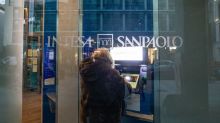Intesa Sanpaolo S.p.A. (ISNPY)
OTC Markets OTCPK - OTC Markets OTCPK Delayed price. Currency in USD
Add to watchlist
At close: 03:51PM EDT
| Previous close | 24.05 |
| Open | 24.07 |
| Bid | 24.22 x 27000 |
| Ask | 24.24 x 40000 |
| Day's range | 24.07 - 24.25 |
| 52-week range | 14.84 - 24.75 |
| Volume | |
| Avg. volume | 210,677 |
| Market cap | 73.381B |
| Beta (5Y monthly) | 1.29 |
| PE ratio (TTM) | 8.27 |
| EPS (TTM) | 2.93 |
| Earnings date | 30 Jul 2024 |
| Forward dividend & yield | 1.92 (7.99%) |
| Ex-dividend date | 20 May 2024 |
| 1y target est | 26.28 |
 Zacks
ZacksISNPY or TD: Which Is the Better Value Stock Right Now?
ISNPY vs. TD: Which Stock Is the Better Value Option?
 Bloomberg
BloombergIntesa Plans SRT Deals Tied to at Least €4.5 Billion of Loans
(Bloomberg) -- Intesa Sanpaolo SpA is working on deals to sell credit-linked notes known as significant risk transfers tied to a pool of at least €4.5 billion ($4.8 billion) of loans, according to people familiar with the matter.Most Read from BloombergSupreme Court Says Trump Has Some Immunity, Delaying Trial24-Hour Stock Trading Is Booming – and Wall Street Is RattledBlackRock Buys Preqin for $3.2 Billion in Private Data PushTrump as President or Private Citizen: Why Supreme Court’s Immunity R
 Zacks
ZacksThe Zacks Analyst Blog Highlights Intesa Sanpaolo, Ford Motor and Cummins
Intesa Sanpaolo, Ford Motor and Cummins are included in this Analyst Blog.